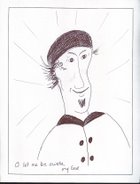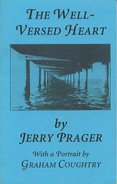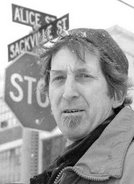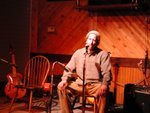The
children of forgotten Lou'sian,
in
a warehouse called Haven
black,
white and brown, high yellow and Asian,
Choctaw,
Creek and Houmas,
salvaged
from a derelict time,
refuse
of the atomic age, escapees
from
the implosion of nuclear families,
abused,
berated, shattered and bereft
led
out of New Awlins over the snaking Mississippi
by
their own daemon genius for flight,
cities
draining youth from their catchments.
Some
never made it back, some did;
some
went down to the water's edge and
what
became of them
after
that brief shining time when they lived as one,
that
long Summer of Love ago,
back
when they made their way through broken windows
past
unwound clocks and calendars of other days:
dragging
tables chairs beds and blankets through the night,
creating
a kitchen in candlelight
that
no street ever saw; shadows within shadows
within
darkness defying despair?
What
became of them
hunting
dumpsters for food and reusables,
making
meals in big pots, always enough for all,
trying
not to steal so the law wouldn't care:
theft
the only unforgivable crime in America?
Boys
almost men sold themselves to uptown Cadillacs
for
cum-blown rides in quiet corners, buggered in rooms,
torn
out of childhood, shames still buried, shames buried with them:
girls,
escaped from ponytails and barbie dolls,
selling
themselves, taken in every hole by hard, or lonely men,
returning
with food and medicines and sundries: scars
and
secrets no one ever learned; a city
that
had no idea they were beating time together
in
a place they called Haven, Havre, Bìfēnggǎng,
Rifugio and Attuko.
That
life became Jimmy Little Rat, for whom no crack was too small
the
stealth of shadows, the diffidence of cats,
vanished
into a sewer and never came back.
Became
Linda the Red, and Billy the Knife, who took one another
as
husband and wife then rode the junk train in their veins
til
they had to be carried away, left
where
others would find them, untraceable,
no
one but those who carried them caring,
until
newsmen dug up their families in Slaughter
set
the flames of addiction burning
for
treatments that came too late
for
Billy Roberts and his Creek wife, Linda Tuskineah.
That
life became Pistolero
Pete,
the
fifteen year old Chicano card shark,
who
fancied himself a Riverboat blackleg but upped the wrong ante one
hand too many, staggering down Patterson, with a stiletto-opened
back,
found
cold on the Levee dead eyes open on the River of his dreams,
left
by the kids for the cops, the only time he was ever caught,
his
discovered corpse becoming their joke in his honour ever after.
The
oldest was twenty, the youngest, twelve, Kitty,
tubercular,
runaway from Slidell, carried on a board
by
the child whores though hurricane debris, coughing black blood,
past
roofless, wailing, plaster-eyed nuns
who
received her like a sacrament;
until
seven years later, a newly frocked priest
gave
up his collar for her good graces;
still
working the hallucinatory streets,
missionary
saints to runaways.
Children
of forgotten Lou'sian, scavenge themselves
out
of an abandoned wilderness, blow Teliko
on
brass fittings and pipes, drum buckets and cans.
strung-wire
screwed onto resonators strummed
for
joy and ache wailing burnt-out basements,
becoming
music the working world never hears,
concrete
floors painted with their rage and redemptions,
resounding
walls scrawled with their couplets and epitaphs,
their
spoken minds chalked on giant beams from ancient forests,
carve
themselves into soft brick walls,
Roman
reliefs becalming unlit catacombs.
They
slept and sleep together in arrays,
twos,
threes, fours and many at once
loving,
pleasing, despairing, desperate for kindness
from
anyone, indifferent to background, to all the codes
they
bring like baggage, busted open, remade into one rule:
protect
haven and those who live and lived there, always.
Like
Ginny Lupo, who everyone claimed was related to a mafia don
and
who could talk her way out of anything but a run-in
with
a wop-hating cracker from Gretna who beat her so badly
she
spent months recovering, while the cracker went on with his business,
until
she could speak again, after which, her assailant was found
with
a bullet in his brain, hanging on a lamppost on Tolliss
near
the Crescent City Bridge, after which
she
went home came back with food and blankets and wine
time
after time; never forgot her friends and never will.
Like
Saint Odile, the daughter of a preacher from Thibodaux,
whose
bed was open anytime loneliness broke one of them,
til
she got pregnant and carried the child to full term,
gave
birth in a heating duct,
and
left her son with the Ladies Auxiliary,
the
rumour's always told, how she's been a cook,
working
an oil platform, shipping out of Beaumont, Texas,
and
another rumour always told,
that
she keeps leaving children for her daddy,
but
no one knows why, though several went asking
and
no one has found her, but they'll never stop looking.
Children
and teens burned through life; come through years never enough;
the
other Summer of Love was for those with flowers in their hair,
they
themselves knew only full life bore on Sanctuary Drive
where
wharves rot on pilings in the river sheen
of
oil tanker rust while brackish wash among dying reeds
recites
the coral snake rhyme becoming handy sometimes
“Red
and yellow, kill a fellow; red and black, friend of Jack.”
And
for those still alive now, the memories never died,
and
for those who died then, they're inside those who survived,
and
for those whose minds broke or silenced,
they
too, are remembered across years,
the
living still hoping
to
lead them back
in
the name of the one
who
was hung on a tree,
the
one at the heart,
lynched
out of hate,
never
forgotten,
whose
only crime
was
doing the best he could
for
those who needed him,
lynched
for being black,
for
loving someone lighter,
someone
who
remembers
each day since,
including
the days
when
the walking streets almost took her
til
others who loved her
got
her home before
she
too found a branch
on
the same tree
to
bear what she could not.
The
children of forgotten Lou'sian,
black,
white and brown, high yellow and Asian,
Choctaw,
Creek and Houmas,
salvaged
from a derelict time,
refuse
of the atomic age, escapees
from
the implosion of nuclear families,
abused,
berated, shattered and bereft
led
out of New Awlins and across the Mississippi
the
way all cities drain youth from their catchments
the
way some never make it back, the way some always escape
the
way some always end up on the water's edge sinking
because
no one knows when it began, or if it can ever end.



